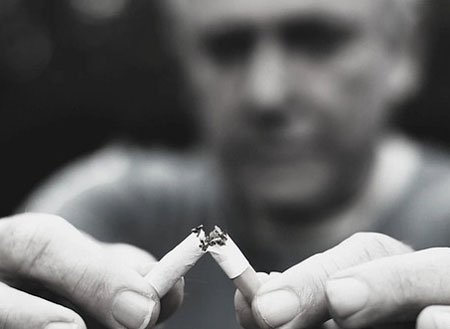As we talk about the different aspects of our general health that can affect our orthopaedic care, cigarette smoking is important to consider. Smoking has greatly decreased in popularity, but its prevalence can complicate the care we provide. The detriment cigarette smoking has on the respiratory system is widely known, but the devastating effects the habit has on the musculoskeletal system are also worth discussing.
Like diabetes, cigarette smoking can compromise the body’s natural healing process. How does this happen, you might ask? Well, smoking allows carbon monoxide to enter your blood cells, which subsequently decreases the amount of oxygen available in the blood. It also narrows the blood vessels that allow oxygen and healing nutrients access to the injured area. Nicotine has also been found to hinder the production of bone-healing osteoblasts. This compromised process affects both wound healing and bone healing, which renders surgical intervention in the orthopaedic realm difficult without serious complication.
Besides hindering healing, smoking also increases the risk of infection. That poorly oxygenated blood supply we just mentioned? It also contains infection-fighting agents like neutrophils. A bloodstream that lacks neutrophils cannot fight infection as effectively as healthy, oxygen-filled blood, which leaves the body susceptible to infection. An infection developing after surgery or injury can significantly slow down the healing process and cause the need for extended antibiotic therapy.
Smokers are also at a higher risk of developing a blood clot due to the altered coagulation properties of the blood supply caused by the effect nicotine has on the platelets. Nicotine can cause the platelets to stick together more easily. Sustaining a blood clot is already a risk of surgical intervention or immobilization of an extremity. Cigarette smoking further increases that risk.
Unfortunately, our surgeons are forced to think twice prior to proceeding with elective surgery on patients with heavy smoking habits. We do our best to set our patients up for success in their postoperative recovery and smoking doesn’t fit that bill. Our physicians will often advise that patients first quit smoking prior to pursuing surgical intervention.
The body requires three days without a cigarette to rid the bloodstream of carbon
monoxide. If a patient needing surgery can refrain from smoking in the days leading up to the procedure, the chance of complication can be decreased, which then increases the chance of a successful surgical outcome. Our goal is always to get our patients back to their healthiest state when orthopaedic injury strikes, but we cannot combat the devastating effects of smoking. Rehabilitating from surgical intervention is difficult enough. Don’t let smoking hinder your progress toward a healthier and more active tomorrow.
The information contained in this blog was obtained from UW Health (https://www.uwhealth.org/healthfacts/tobacco/6150.pdf), the American Academy of Orthopaedic Surgeons (https://orthoinfo.aaos.org/en/treatment/surgery-and-smoking/), and the National Library of Medicine (https://pubmed.ncbi.nlm.nih.gov/1323208/).

